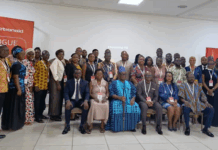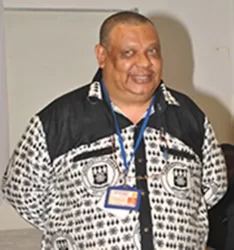By Kizito CUDJOE
Ghana has taken a notable step toward enhancing its energy infrastructure with the launch of sub-Saharan Africa’s first NuScale Power Energy Exploration (E2) Centre at the Graduate School of Nuclear and Allied Sciences in Accra.
The E2 centre is expected to play a key role in improving reliable energy access in Ghana and the wider African region. The facility was funded by the U.S. Department of State’s Foundational Infrastructure for Responsible Use of Small Modular Reactor Technology (FIRST) programme.
U.S. Ambassador to Ghana, Virginia Palmer, recognised the centre’s potential for collaboration between Ghana and the United States in developing advanced nuclear technologies. These innovations, she noted, hold significant promise for addressing energy challenges across Africa.
“U.S. small modular reactors – or SMRs – and other advanced reactor technologies build on more than 65 years of U.S. innovation and expertise in nuclear energy,” Ambassador Palmer said.
“These new reactor designs can be scaled to meet a country’s specific needs. They have a variety of potential applications, including power generation, desalination and heat for industrial processes. Most importantly, the SMRs designed in the United States feature the latest advancements in safety systems, demonstrating our commitment to the highest standards for nuclear safety, security and nonproliferation.”
Ambassador Palmer also noted the importance of reliable energy access for economic progress, describing nuclear energy as a transformative force for development. “Nuclear energy offers a level of reliability and efficiency that other clean technologies cannot always match,” she said.
Furthermore, she lauded the country’s pursuit of energy independence and economic growth, describing the facility as a leap forward in collaborative efforts to enhance energy security and sustainability in the region.
The state-of-the-art facility is expected to provide invaluable training and career development opportunities for local engineers and technicians, equipping them with the skills to operate and maintain advanced nuclear technologies.
“The United States is making an investment in this SMR training hub not only for Ghana, but for the Sub-Saharan Africa region,” Ambassador Palmer added.
Beyond the E2 centre’s launch, the U.S.-Ghana partnership includes the establishment of a nuclear welding certification programme and collaboration with Texas A&M University to develop SMR-related curricula.
The Accra-based SMR training hub aims to become a valuable resource for workforce development and capacity building across Africa, cultivating a new generation of skilled professionals to drive the energy sector forward.
The inauguration was attended by key stakeholders, including Rev. Dr. Patrick Nomo – Chief Director of the Ministry of Environment, Science and Technology; and representatives from the Nuclear Power Institute of the Ghana Atomic Energy Commission (GAEC).
The E2 centre employs state-of-the-art computer modelling within a NuScale 12-module small modular reactor (SMR) control room. It is expected to deliver hands-on education and training for future African nuclear professionals, ensuring the safe and secure operation of advanced civil nuclear reactors.
Supported by the FIRST capacity-building programme in partnership with the International Science and Technology Center and NuScale Power, the E2 centre is part of a broader initiative.
Senior Bureau Official for the Bureau of International Security and Non-proliferation, Ann Ganzer, announced the E2 centre, envisioned as part of an SMR Regional Training Hub and Center of Excellence, at the FIRST Africa Regional Conference held in Accra in 2023.
The U.S.-Ghana FIRST partnership, initiated in 2022, builds on the 2021 Memorandum of Understanding Concerning Strategic Civil Nuclear Cooperation. This agreement strengthens collaboration on nuclear energy and reinforces the long-standing diplomatic and economic relationship between the two countries.
The U.S. reiterated its commitment to supporting the safe, secure and peaceful use of nuclear technology to advance energy access and energy security in Ghana, across Africa and globally.










